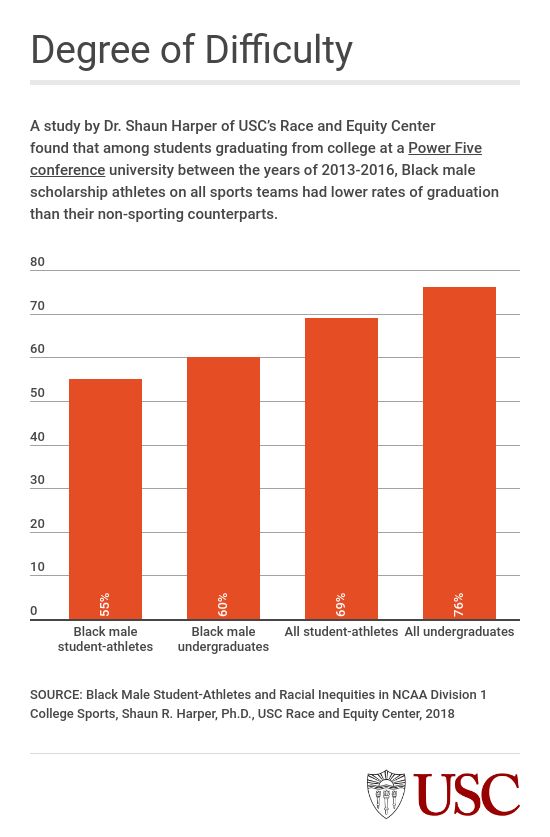Black male student-athletes and racial inequities in college sports
At many universities, Black males are more likely to graduate if they’re not players.
Contact: Ron Mackovich, (213) 810-8583 or rmackovi@usc.edu
A new report from USC finds that while Black men make up over half of student-athletes on scholarship, they comprise just 2.4 percent of undergraduates at Power Five athletic conference universities.
Provost Professor Shaun Harper of the USC Race and Equity Center studied 65 universities for the third edition of “Black Male Student-Athletes and Racial Inequities in NCAA Division 1 College Sports.”
“If you’re a Black man, you have a better chance of graduating if you don’t play,” said Harper, Provost Professor in the USC Rossier School of Education and USC Marshall School of Business at the University of Southern California. “Young Black athletes are seduced by prospects of full-ride scholarships and the chance to go pro. But graduation rates expose the ‘athlete advantage’ myth.”
Black male scholarship athletes less likely to graduate
Harper, a nationally recognized leader in the research of diversity, inclusion and equity in U.S. higher education, has been studying racial imbalance at athletic powerhouse universities for over a decade.
“What I still find shocking is that these trends are so pervasive, yet institutional leaders, the NCAA and athletics conference commissioners have not done more in response to them,” said Harper.
Harper’s research goes beyond basketball and football, and includes Black male scholarship athletes on all sports teams. He analyzed data from the NCAA Federal Graduation Rates Database, along with each institution’s federal graduation rates. Four cohorts were examined.
At 59 percent of the universities studied, those athletes were less likely to graduate than Black males not involved in intercollegiate athletics.
Graduation rates for Black male athletes in Power Five conferences
The statistics from the Power Five conferences – ACC, Big Ten, Big 12, Pac 12, and SEC – show enduring inequities in six-year graduation rates, along with incremental progress at some programs. Among the findings:
- Graduation rates for Black male student-athletes have declined over the past two years at 40 percent of the universities studied.
- Black male student-athletes across four cohorts graduated at just over 55 percent, compared to more than 76 percent of undergraduate students, and 60 percent of Black undergraduate men overall.
- Only four universities graduated Black male student-athletes at rates higher than or equal to student athletes overall.
- Overall graduation rates for Black male student-athletes have increased 2.5 percentage points over the past two years.
Colleges respond to report
By exposing the issue of ethnic imbalance, Harper hopes to inspire administrators to hold themselves accountable.
“When we did our first report six years ago, we hoped this would be a wake-up call that would lead to change,” Harper said. “Yet these inequities still persist. While there has been a slight increase in graduation rates, there are still durable inequities.”
Recommendations include:
- A commission on racial equity within the NCAA, and in each athletic conference.
- Partnerships between athletic conferences and institutions to narrow racial gaps.
- A policy banning postseason play for any team that fails to graduate at least 40 percent of its players.
- A percentage of revenue dedicated to programming and interventions to improve racial equity within and beyond sports.

